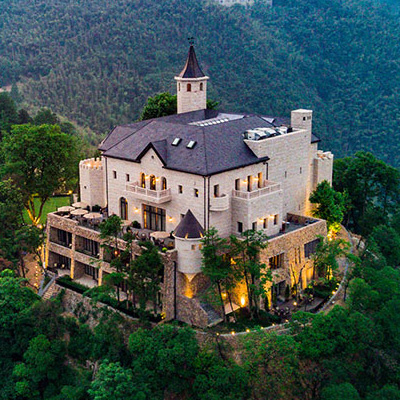
In 1910, during his 45 years in China, Scottish missionary Dr. Duncan Main built a European style castle villa on a Moganshan mountaintop, now naked Castle. With a legacy that’s still alive today, he spurred medical advancements in Hangzhou and spread healthy living concepts among the local population. The castle’s second owner was national patriot and former Chairman of Zhejiang, Zhang Jingjiang, dubbed a ‘revolutionary saint’ by Sun Yatsen. The two men never met but each inspired during turbulent times and both have become part of the fabric of Moganshan itself.
Dr. Duncan Main was born on June 6, 1856 in Edinburgh, Scotland. After he graduated from medical school in 1881 the then British Christian Mission Society arranged to send him to China. Dr. Main and his new wife, Florence Nightingale Smith, soon headed to Hangzhou.
In 1910, at the age of 55, Dr. Main purchased 75mu of land on Paotai Mountain on which he built a European style castle villa (the predecessor to the Castle at naked Castle). The plot included a tennis court, swimming pool and long walking trails. Due to the lack of medical resources in Moganshan at that time, the villa became a remote hospital to treat locals. In 1926, 71-year-old Dr. Main retired to Scotland. During his lifetime, he founded more than 30 hospitals, medical schools and shelters. The Hospital of Universal Benevolence, where he was originally posted, grew to 3 functional operating rooms and could treat 4,000 patients at a time. It was the most advanced, in terms of technology and business administration, western medicine hospital in China. On August 30, 1934, Dr. Main passed away. His grave in Scotland was engraved with the Chinese words “仁爱而劳”, meaning “Labour of Love”. Even in death, Dr. Main continued to inspire future generations in Moganshan and his legacy lives on today.
In addition to his contributions to China, people loved and respected Dr. Main for his quick wit and lively personality. He thrived in his work, always considering the health of others. What a coincidence that decades later, naked is also spreading a healthy lifestyle to the people of China!
Zhang Jingjiang was born into a silk merchant’s family on September 19, 1877. He backed historical figures Dr. Sun Yatsen, Chiang Kaishek and Cai Yuanpei, and was known as one of the four patriarchs of the Kuomintang. Dr. Sun Yatsen called him “Qi Ren” or “Geming Sheng Ren” meaning “The Man” and “Revolutionary Saint”; Chiang Kai-Shek called him a “Revolutionary Mentor”.
Between 1928 and 1930, when Zhang Jingjiang was Chairman of Zhejiang, he created the Moganshan Bureau with the singular goal of taking back the land and villas from the foreigners who occupied Moganshan at that time, including Dr. Main’s famous “castle” villa, which was then used as the office for the Moganshan Bureau. In 1932, when Zhang Jingjiang was part of the board for Jiangnan Auto Company, the company bought The Castle outright from Dr. Main’s son. Its name was officially changed to “Green Shade Inn”, and it was used to entertain power players in politics and business. In 1937, Zhang Jingjiang left China and the Castle began to deteriorate.
In 1960, this legendary villa collapsed and its storied past fell into slumber in the forest. However, its splendor could not remain concealed for long. In 2007, naked discovered the site of ruins, rediscovering history, rebuilding and restoring the Castle to its former glory.



This unsolved mystery aroused curiosities amongst scholars from all over the world, and even received attention of BBC and many other medias. Robert Parker, a writer, historian, and professor from the University of Bristol, speculated from a Chinese newspaper report in 1929 that it might be original name that Dr. Duncan Main’s wanted to name for the castle. A staff member who worked at Glenturret, speculated that Dr. Duncan Main might have worked in a shipyard in Glasgow, and during that period there was a ship named Glenturret. The exact history of this huge rock has not yet been proven, leaving endless speculation for future generations, and adding a strong sense of legend to the castle and the bar.